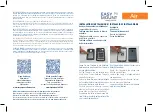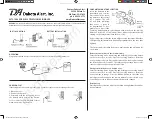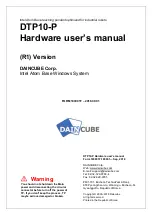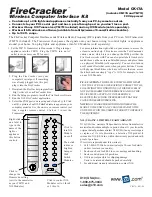
26
GAZELLE MANUAL
26
Original User Manual | Pedelec Impulse 2.0
Mountain bikes.
MAXIMUM WEIGHT LIMIT
RIDER
LUGGAGE*
TOTAL
lbs / kg
lbs / kg
lbs / kg
300 / 136
5 / 2.3
305 / 138
* Seat Bag Only
Dirt Jump
CONDITION 5
Bikes designed for jumping, hucking,
high speeds, or aggressive riding on
rougher surfaces, or landing on flat
surfaces. However, this type of riding
is extremely hazardous and puts
unpredictable forces on a bicycle which may overload the
frame, fork, or parts. If you choose to ride in Condition 5
terrain, you should take appropriate safety precautions
such as more frequent bike inspections and replacement
of equipment. You should also wear comprehensive safety
equipment such as a full-face helmet, pads, and body
armor.
INTENDED For man-made dirt jumps, ramps, skate
parks other predictable obstacles and terrain where
riders need and use skill and bike control, rather than
suspension. Dirt Jumping bikes are used much like heavy
duty BMX bikes.
A Dirt Jumping bike does not give you skills to jump. Read
Section 2. F, p. 10.
NOT INTENDED For terrain, drop offs or landings where
large amounts of suspension travel are needed to help
absorb the shock of landing and help maintain control.
TRADE OFF Dirt Jumping bikes are lighter and more
nimble than Freeride bikes, but they have no rear
suspension and the suspension travel in the front is much
shorter.
MAXIMUM WEIGHT LIMIT
RIDER
LUGGAGE
TOTAL
lbs / kg
lbs / kg
lbs / kg
300 / 136
0
300 / 136
cross country bikes. All-Mountain bikes are lighter, more
nimble and easier to ride uphill than Freeride bikes. All-
Mountain bikes are not as rugged as Freeride bikes and
must not be used for more extreme riding and terrain.
MAXIMUM WEIGHT LIMIT
RIDER
LUGGAGE*
TOTAL
lbs / kg
lbs / kg
lbs / kg
300 / 136
5 / 2.3
305 / 138
* Seat Bag Only
Gravity, Freeride, and Downhill
CONDITION 5
Bikes designed for jumping, hucking,
high speeds, or aggressive riding on
rougher surfaces, or landing on flat
surfaces. However, this type of riding
is extremely hazardous and puts
unpredictable forces on a bicycle which may overload the
frame, fork, or parts. If you choose to ride in Condition 5
terrain, you should take appropriate safety precautions
such as more frequent bike inspections and replacement
of equipment. You should also wear comprehensive safety
equipment such as a full-face helmet, pads, and body
armor.
INTENDED For riding that includes the most difficult
terrain that only very skilled riders should attempt.
Gravity, Freeride, and Downhill are terms which
describe hardcore mountain, north shore, slopestyle.
This is “extreme” riding and the terms describing it are
constantly evolving.
Gravity, Freeride, and Downhill bikes are: (1) heavier
and have more suspension travel than All-Mountain bikes,
allowing them to be ridden in more difficult terrain, over
larger obstacles and larger jumps, (2) the longest in
suspension travel and use components that fit heavy duty
intended use. While all that is true, there is no guarantee
that extreme riding will not break a Freeride bike.
The terrain and type of riding that Freeride bikes
are designed for is inherently dangerous. Appropriate
equipment, such as a Freeride bike, does not change this
reality. In this kind of riding, bad judgment, bad luck, or
riding beyond your capabilities can easily result in an
accident, where you could be seriously injured, paralyzed
or killed.
NOT INTENDED To be an excuse to try anything.
Read Section 2. F, p. 10.
TRADE OFF Freeride bikes are more rugged than All-
Mountain bikes, for riding more difficult terrain. Freeride
bikes are heavier and harder to ride uphill than All-
















































